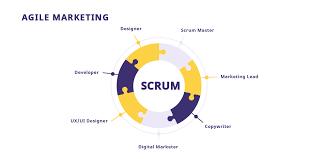The Power of Agile Marketing in Today’s Digital Landscape
In today’s fast-paced and ever-changing digital landscape, traditional marketing strategies are often not enough to keep up with the competition. This is where agile marketing comes into play, offering a dynamic and flexible approach to marketing that allows businesses to adapt quickly to market trends and consumer behaviour.
Agile marketing is based on the principles of agile software development, emphasising collaboration, flexibility, and responsiveness. By breaking down marketing initiatives into smaller, manageable tasks and iterating quickly based on feedback and data, agile marketing enables businesses to stay ahead of the curve and deliver impactful campaigns in a timely manner.
One of the key benefits of agile marketing is its ability to respond swiftly to changes in the market. With traditional marketing methods, long planning cycles and rigid strategies can hinder a brand’s ability to pivot in response to new opportunities or challenges. Agile marketing, on the other hand, allows teams to make quick adjustments based on real-time data and feedback, ensuring that campaigns are always relevant and effective.
Another advantage of agile marketing is its focus on collaboration and cross-functional teams. By bringing together individuals from different departments – such as marketing, sales, product development, and customer service – agile marketing fosters a culture of teamwork and innovation. This collaborative approach not only leads to more creative ideas but also ensures that all aspects of a campaign are aligned towards a common goal.
In conclusion, agile marketing offers a powerful solution for businesses looking to thrive in today’s digital landscape. By embracing flexibility, responsiveness, and collaboration, brands can stay ahead of the competition, engage with their audience more effectively, and achieve measurable results. In an era where change is constant and consumer expectations are high, agile marketing provides the agility needed to succeed.
Understanding Agile Marketing: Benefits, Types, Examples, and Core Principles
- What are the benefits of agile marketing?
- What are the 4 types of agile?
- What are examples of agile marketing companies?
- What is agility in marketing?
What are the benefits of agile marketing?
Agile marketing offers a range of benefits that are crucial for businesses striving to stay competitive in today’s dynamic digital landscape. One key advantage of agile marketing is its ability to adapt quickly to changing market conditions and consumer preferences. By breaking down marketing initiatives into smaller, manageable tasks and iterating based on real-time feedback, agile marketing allows businesses to respond swiftly to new opportunities and challenges. Additionally, the collaborative nature of agile marketing fosters cross-functional teamwork, leading to more creative ideas and cohesive campaigns. Ultimately, the flexibility, responsiveness, and focus on continuous improvement inherent in agile marketing enable brands to achieve better results, engage with their audience more effectively, and drive meaningful business outcomes.
What are the 4 types of agile?
In the realm of agile marketing, there are four main types of agile methodologies that are commonly utilised: Scrum, Kanban, Lean, and Extreme Programming (XP). Each of these agile approaches offers its own set of principles and practices to help marketing teams streamline their processes, improve collaboration, and deliver results more efficiently. Understanding the nuances of these agile methodologies can empower marketers to choose the approach that best aligns with their goals and working style, ultimately enhancing their ability to adapt quickly to changing market dynamics and consumer demands.
What are examples of agile marketing companies?
When exploring examples of agile marketing companies, it is evident that various industry leaders have successfully embraced agile principles to drive their marketing strategies. Companies like HubSpot, Spotify, and Netflix are often cited as prime examples of organisations that have effectively implemented agile marketing practices. These companies demonstrate a commitment to flexibility, rapid iteration, data-driven decision-making, and cross-functional collaboration, all of which are key components of agile marketing. By continuously adapting to market changes, experimenting with new ideas, and prioritising customer feedback, these agile marketing companies have been able to stay ahead of the curve and deliver innovative campaigns that resonate with their target audiences.
What is agility in marketing?
Agility in marketing refers to the ability of a marketing team or organisation to quickly adapt and respond to changes in the market, consumer behaviour, and competitive landscape. It involves being flexible, nimble, and proactive in adjusting marketing strategies, campaigns, and tactics based on real-time data and feedback. Agility in marketing enables businesses to stay ahead of trends, seize opportunities, overcome challenges, and deliver more relevant and impactful messages to their target audience. By embracing agility, marketers can achieve better results, drive growth, and maintain a competitive edge in today’s fast-paced and ever-evolving digital environment.
